2024年中考英语复习词法专题★★代词课件
文档属性
| 名称 | 2024年中考英语复习词法专题★★代词课件 |  | |
| 格式 | pptx | ||
| 文件大小 | 1.1MB | ||
| 资源类型 | 教案 | ||
| 版本资源 | 通用版 | ||
| 科目 | 英语 | ||
| 更新时间 | 2024-05-21 08:59:18 | ||
图片预览


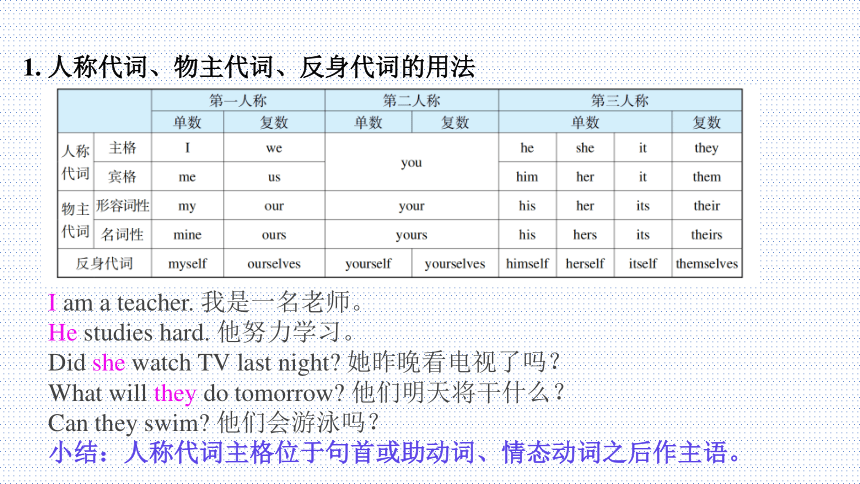
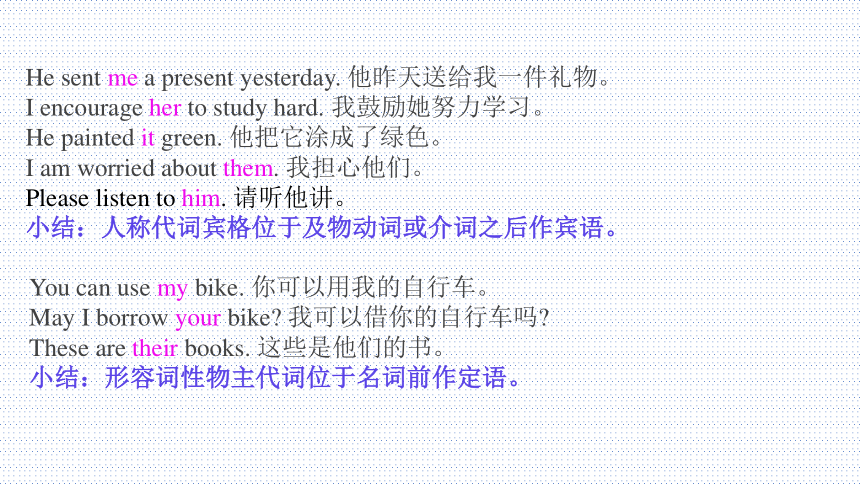
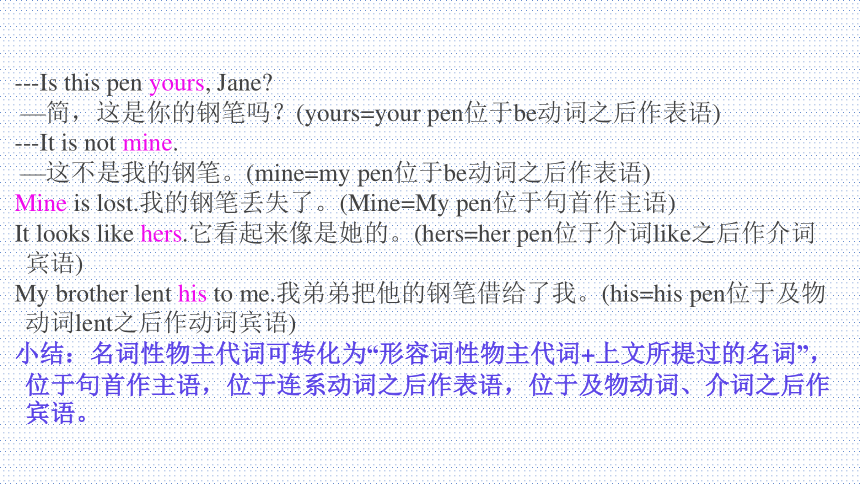
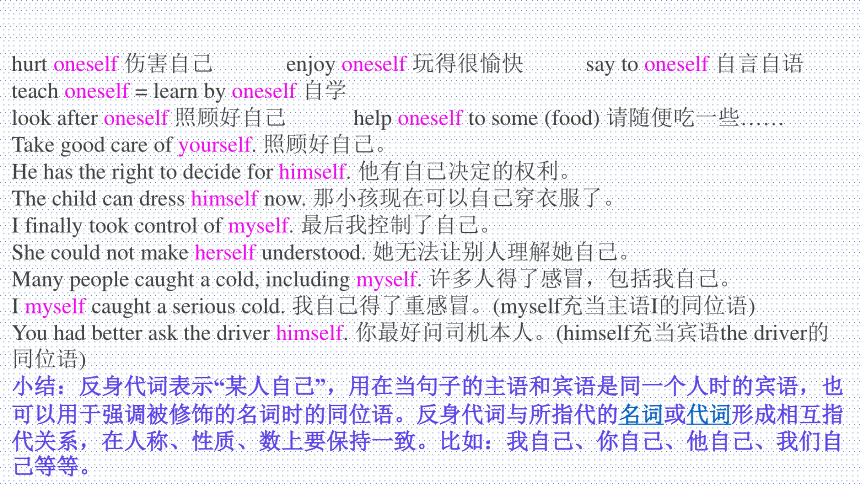
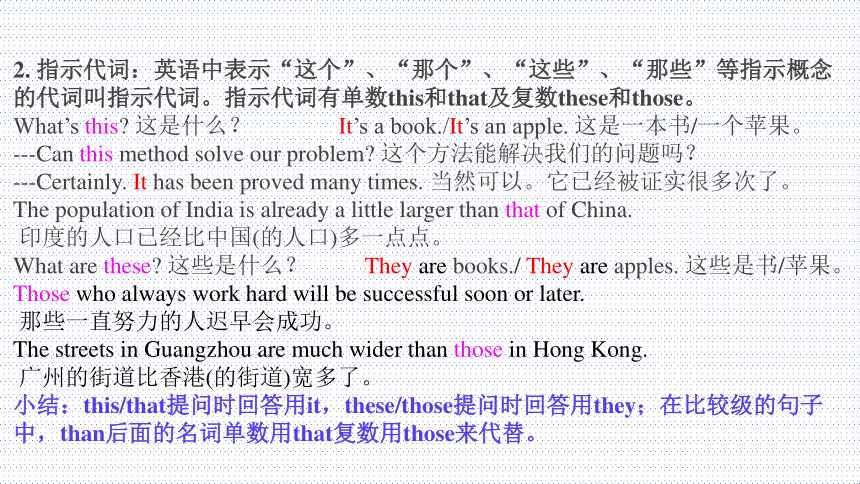
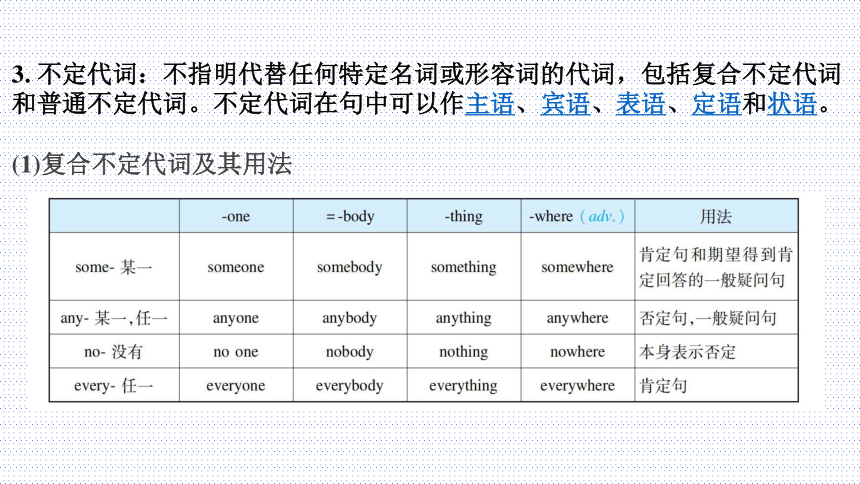
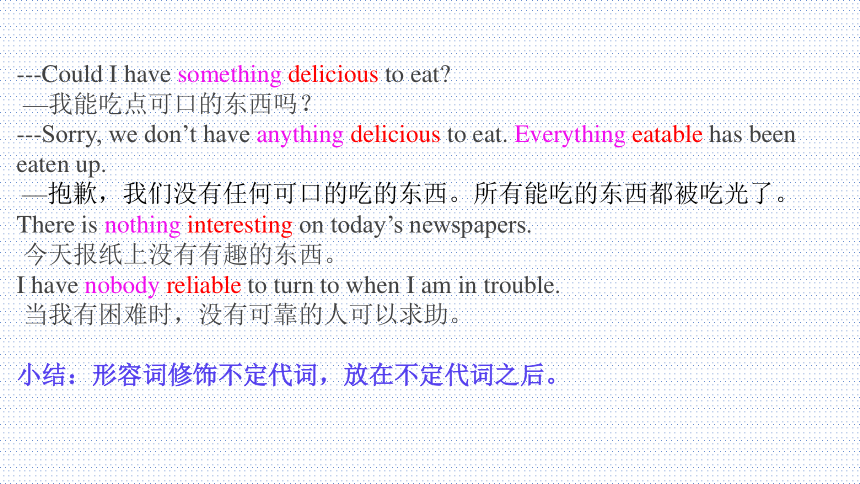
文档简介
(共21张PPT)
2024年中考英语复习词法专题★★
代 词
代词是指为了避免重复,用来代替名词或起名词作用的短语或句子的一种词类,大多数代词具有名词和形容词的功能。英语中的代词,按其意义、特征及在句中的作用可分为人称代词、物主代词、反身代词、指示代词、不定代词、相互代词、疑问代词、连接代词、关系代词等。
代词的定义和分类
1. 人称代词、物主代词、反身代词的用法
I am a teacher. 我是一名老师。
He studies hard. 他努力学习。
Did she watch TV last night 她昨晚看电视了吗?
What will they do tomorrow 他们明天将干什么?
Can they swim 他们会游泳吗?
小结:人称代词主格位于句首或助动词、情态动词之后作主语。
He sent me a present yesterday. 他昨天送给我一件礼物。
I encourage her to study hard. 我鼓励她努力学习。
He painted it green. 他把它涂成了绿色。
I am worried about them. 我担心他们。
Please listen to him. 请听他讲。
小结:人称代词宾格位于及物动词或介词之后作宾语。
You can use my bike. 你可以用我的自行车。
May I borrow your bike 我可以借你的自行车吗
These are their books. 这些是他们的书。
小结:形容词性物主代词位于名词前作定语。
---Is this pen yours, Jane
—简,这是你的钢笔吗?(yours=your pen位于be动词之后作表语)
---It is not mine.
—这不是我的钢笔。(mine=my pen位于be动词之后作表语)
Mine is lost.我的钢笔丢失了。(Mine=My pen位于句首作主语)
It looks like hers.它看起来像是她的。(hers=her pen位于介词like之后作介词宾语)
My brother lent his to me.我弟弟把他的钢笔借给了我。(his=his pen位于及物动词lent之后作动词宾语)
小结:名词性物主代词可转化为“形容词性物主代词+上文所提过的名词”,位于句首作主语,位于连系动词之后作表语,位于及物动词、介词之后作宾语。
hurt oneself 伤害自己 enjoy oneself 玩得很愉快 say to oneself 自言自语 teach oneself = learn by oneself 自学
look after oneself 照顾好自己 help oneself to some (food) 请随便吃一些……
Take good care of yourself. 照顾好自己。
He has the right to decide for himself. 他有自己决定的权利。
The child can dress himself now. 那小孩现在可以自己穿衣服了。
I finally took control of myself. 最后我控制了自己。
She could not make herself understood. 她无法让别人理解她自己。
Many people caught a cold, including myself. 许多人得了感冒,包括我自己。
I myself caught a serious cold. 我自己得了重感冒。(myself充当主语I的同位语)
You had better ask the driver himself. 你最好问司机本人。(himself充当宾语the driver的同位语)
小结:反身代词表示“某人自己”,用在当句子的主语和宾语是同一个人时的宾语,也可以用于强调被修饰的名词时的同位语。反身代词与所指代的名词或代词形成相互指代关系,在人称、性质、数上要保持一致。比如:我自己、你自己、他自己、我们自己等等。
2. 指示代词:英语中表示“这个”、“那个”、“这些”、“那些”等指示概念的代词叫指示代词。指示代词有单数this和that及复数these和those。
What’s this 这是什么? It’s a book./It’s an apple. 这是一本书/一个苹果。
---Can this method solve our problem 这个方法能解决我们的问题吗?
---Certainly. It has been proved many times. 当然可以。它已经被证实很多次了。
The population of India is already a little larger than that of China.
印度的人口已经比中国(的人口)多一点点。
What are these 这些是什么? They are books./ They are apples. 这些是书/苹果。
Those who always work hard will be successful soon or later.
那些一直努力的人迟早会成功。
The streets in Guangzhou are much wider than those in Hong Kong.
广州的街道比香港(的街道)宽多了。
小结:this/that提问时回答用it,these/those提问时回答用they;在比较级的句子中,than后面的名词单数用that复数用those来代替。
3. 不定代词:不指明代替任何特定名词或形容词的代词,包括复合不定代词和普通不定代词。不定代词在句中可以作主语、宾语、表语、定语和状语。
(1)复合不定代词及其用法
---Could I have something delicious to eat
—我能吃点可口的东西吗?
---Sorry, we don’t have anything delicious to eat. Everything eatable has been eaten up.
—抱歉,我们没有任何可口的吃的东西。所有能吃的东西都被吃光了。
There is nothing interesting on today’s newspapers.
今天报纸上没有有趣的东西。
I have nobody reliable to turn to when I am in trouble.
当我有困难时,没有可靠的人可以求助。
小结:形容词修饰不定代词,放在不定代词之后。
Someone is waiting for you at the school gate, but I’m not sure who he is.
有人在校门口等你,但我不能确定他是谁。
Anyone who leaves the classroom last should turn off the lights.
任何最后离开教室的人都要关灯。
Everything is under control. There is nothing for you to worry about.
一切尽在掌控之中,没有什么事需要你担心的。
小结:不定代词作主语,谓语动词用单数;代词指代不定代词,指人的用he, 指物的用it。
(2) 常见的普通不定代词:some, any, much,many, little, a little, few, a few, both, several, all, neither, none, either, each, other, the other, others, the others, another, one, ones, every
There are many students on the playground. Some are running, some are playing basketball.
操场上有许多学生。有的在跑步,有的在打篮球。
---May I have some oranges/milk 我可以买些桔子/牛奶吗?
---Sure, I will give you some. 我就给你一些。
小结:some表示“一些、某些、某个、任一”,用来代替名词,用在肯定句和期望得到别人肯定回答的一般疑问句中,可作主语、宾语、定语等;作定语时,它可以修饰可数名词和不可数名词。
---Do we have any oranges/milk 我们还有桔子/牛奶吗?(定语,名词复数及不可数名词前都可以)
---No, we don’t have any. 没有,我们一点也没有了。(宾语,指代名词复数及不可数名词)
There isn’t any milk at home. 今天家里一点牛奶都没有。(作定语)
You may come to my house at any time tomorrow.
明天你可以任意时间来我家。(作定语)
He isn’t any better today. 他今天根本没有好转。(作状语)
小结:any表示“一些、某些、某个”可以代替名词,常用在否定句或疑问句中作主语、宾语、定语等;作定语时,它可以修饰可数名词复数和不可数名词;不定代词any有时也可以用在肯定句中,表示“任何的”;不定代词any也可以用作状语,表示程度。
He has made many new friends since he came here. Many of them are good at sports.
自从他来这儿他已经交了好多新朋友,他们中的许多人都善于运动。
小结:many表示“许多”,用在可数名词复数前或用来指代可数名词的复数,可作定语或主语。
I always have much work to do. Much of it has to be done day by day.
我总是有许多工作要做。其中的许多工作都必须当天完成。
He drinks lots of/a lot of juice, but he doesn’t drink much water.
他喝很多果汁,但他不怎么喝水。
小结:much表示“许多”,用在不可数名词前或用来指代不可数名词,可作定语或主语。a lot of/ lots of也可以修饰可数名词复数或不可数名词,但不能用于否定句,所以表示否定的“许多”不能用a lot of/ lots of,要根据实际情况用“many/much”来代替。
4. 相互代词:each other, one another
We know each other. 我们互相认识。
They support each other in their work. 他们在工作上互相支持。
We have checked each other’s homework. 我们已经互相检查过彼此的作业。
小结:each other表示“互相,彼此 (多指两者之间)”
We all try and help one another. 我们都尽力互相帮助。
Different countries depend on one another. 国与国之间相互依存。
These stories have an amazing likeness to one another.
这些故事彼此之间有惊人的相似性。
小结:one another表示“互相,彼此 (多指三者及以上相互之间)”
5. 疑问代词:用来表达疑问或构成疑问句的代词,一般放在特殊疑问句的句首。疑问代词本质还是个代词,只不过它代替一个不确定的、等待对方来确认的人或事物。常见的疑问代词有:who谁(主语、宾语), whom谁(who的宾格,作宾语), what什么(主语、宾语), which哪个(定语), whose谁的(定语)。
Who is the man under the tree 树下的那个男人是谁?
Who/Whom can you turn to when you are in need
当你有困难时,你可以向谁求助?
Who/Whom is your mother talking with 你妈妈在跟谁说话
What can I do for you 我能为你做什么?
What have you done for your parents 你为你父母做了什么?
Which subject do you like best 你最喜欢哪一科?
Which boy is your son 哪个男孩是你的儿子?
Whose sweater is this 这是谁的毛衣
Whose books are those 那些是谁的书?
6. 连接代词:引导名词性从句(主语从句、宾语从句、表语从句、同位语从句)的代词被称为连接代词,包括who, whom, whose, what, which, whatever(无论什么), whoever(无论是谁,主语), whomever(无论是谁,宾语), whichever(无论哪一个/位)。
I didn’t know who came to help me at last. 我不知道最后是谁帮助了我。(宾语从句,主语)
He asked me with whom I had discussed the question. 他问我和谁讨论过了这个问题。(宾语从句,宾语)
The first problem is whose purse it is. 首要问题是这是谁的钱包。(表语从句,定语)
Do remember to do what I have told you. 一定要记得去做我告诉你的。(宾语从句,宾语)
The problem which boy is fit for the job hasn’t been solved yet.
哪个男孩适合这项工作的问题还没有解决。(同位语从句,定语)
What I want is whatever you give me. 你给我的任何东西我都想要。(表语从句,宾语)
Whoever leaves the classroom last should turn off the lights and close the doors.
无论谁最后一个离开教室都要关门。(主语从句,主语)
You can talk with whomever you like at the discussion.
讨论时你想和谁讨论就和谁讨论。(宾语从句,宾语)
The writer will present a book to whichever comes to the party.(宾语从句,主语)
7. 关系代词:用于引导定语从句的代词,它们具有关联作用,能把引导的定语从句与所修饰的名词或代词联系起来;英语中常见的关系代词有 that, who, whom, whose, which, as;其中who, whom 只用于指人,which, as 只用于指物,whose, that 既可以指人也可以指物;关系代词在定语从句中主要充当主语、宾语、表语或定语。
I’d like to find a factory that can make this kind of rulers.
我想找一家能生产这种尺子的工厂。
Jane is the person that you can turn to when you are in trouble.
简是当你有困难时能求助的人。
Tom is no longer the kind of person that he used to be.
汤姆不再是他曾经的那种人。
Did you find the pen which you lost
你找到你丢失的笔了吗
The man who saved the boy was my uncle.
救了那个男孩的男人是我叔叔。
Mr Li is the person to whom you can turn for help when necessary.
有需要时李先生是你能求助的人。
She’s the woman whose advice I respect.
她是我尊重其意见和建议的女性。
I’d like a room whose window faces the south.
我想要一个窗户朝南的房间。
As is often the case, Li Hua came to Jane’s help in time.
像往常一样,李华及时帮助了简。
As we all know, girls usually do better than boys in language subjects.
众所周知,在语言学科方面,女生通常比男生学得好。
He has been in China for quite a long time, as you can hear from the way he talks.
他已经在中国很久了,这一点你可以从他说话的方式听出来。
John, as you know, is a famous writer.
正如你所知,约翰是一位著名的作家。
He is not the same shy boy as he used to be.
他再也不是以前那个害羞的男孩了。
小结:As引导的定语从句位置比较灵活:可以放句首,也可以切割整个主句,还可以放在整个主句之后。
8. 学习代词的重点:不定代词的灵活应用、连接代词和关系代词在从句中的应用。
See you !
2024年中考英语复习词法专题★★
代 词
代词是指为了避免重复,用来代替名词或起名词作用的短语或句子的一种词类,大多数代词具有名词和形容词的功能。英语中的代词,按其意义、特征及在句中的作用可分为人称代词、物主代词、反身代词、指示代词、不定代词、相互代词、疑问代词、连接代词、关系代词等。
代词的定义和分类
1. 人称代词、物主代词、反身代词的用法
I am a teacher. 我是一名老师。
He studies hard. 他努力学习。
Did she watch TV last night 她昨晚看电视了吗?
What will they do tomorrow 他们明天将干什么?
Can they swim 他们会游泳吗?
小结:人称代词主格位于句首或助动词、情态动词之后作主语。
He sent me a present yesterday. 他昨天送给我一件礼物。
I encourage her to study hard. 我鼓励她努力学习。
He painted it green. 他把它涂成了绿色。
I am worried about them. 我担心他们。
Please listen to him. 请听他讲。
小结:人称代词宾格位于及物动词或介词之后作宾语。
You can use my bike. 你可以用我的自行车。
May I borrow your bike 我可以借你的自行车吗
These are their books. 这些是他们的书。
小结:形容词性物主代词位于名词前作定语。
---Is this pen yours, Jane
—简,这是你的钢笔吗?(yours=your pen位于be动词之后作表语)
---It is not mine.
—这不是我的钢笔。(mine=my pen位于be动词之后作表语)
Mine is lost.我的钢笔丢失了。(Mine=My pen位于句首作主语)
It looks like hers.它看起来像是她的。(hers=her pen位于介词like之后作介词宾语)
My brother lent his to me.我弟弟把他的钢笔借给了我。(his=his pen位于及物动词lent之后作动词宾语)
小结:名词性物主代词可转化为“形容词性物主代词+上文所提过的名词”,位于句首作主语,位于连系动词之后作表语,位于及物动词、介词之后作宾语。
hurt oneself 伤害自己 enjoy oneself 玩得很愉快 say to oneself 自言自语 teach oneself = learn by oneself 自学
look after oneself 照顾好自己 help oneself to some (food) 请随便吃一些……
Take good care of yourself. 照顾好自己。
He has the right to decide for himself. 他有自己决定的权利。
The child can dress himself now. 那小孩现在可以自己穿衣服了。
I finally took control of myself. 最后我控制了自己。
She could not make herself understood. 她无法让别人理解她自己。
Many people caught a cold, including myself. 许多人得了感冒,包括我自己。
I myself caught a serious cold. 我自己得了重感冒。(myself充当主语I的同位语)
You had better ask the driver himself. 你最好问司机本人。(himself充当宾语the driver的同位语)
小结:反身代词表示“某人自己”,用在当句子的主语和宾语是同一个人时的宾语,也可以用于强调被修饰的名词时的同位语。反身代词与所指代的名词或代词形成相互指代关系,在人称、性质、数上要保持一致。比如:我自己、你自己、他自己、我们自己等等。
2. 指示代词:英语中表示“这个”、“那个”、“这些”、“那些”等指示概念的代词叫指示代词。指示代词有单数this和that及复数these和those。
What’s this 这是什么? It’s a book./It’s an apple. 这是一本书/一个苹果。
---Can this method solve our problem 这个方法能解决我们的问题吗?
---Certainly. It has been proved many times. 当然可以。它已经被证实很多次了。
The population of India is already a little larger than that of China.
印度的人口已经比中国(的人口)多一点点。
What are these 这些是什么? They are books./ They are apples. 这些是书/苹果。
Those who always work hard will be successful soon or later.
那些一直努力的人迟早会成功。
The streets in Guangzhou are much wider than those in Hong Kong.
广州的街道比香港(的街道)宽多了。
小结:this/that提问时回答用it,these/those提问时回答用they;在比较级的句子中,than后面的名词单数用that复数用those来代替。
3. 不定代词:不指明代替任何特定名词或形容词的代词,包括复合不定代词和普通不定代词。不定代词在句中可以作主语、宾语、表语、定语和状语。
(1)复合不定代词及其用法
---Could I have something delicious to eat
—我能吃点可口的东西吗?
---Sorry, we don’t have anything delicious to eat. Everything eatable has been eaten up.
—抱歉,我们没有任何可口的吃的东西。所有能吃的东西都被吃光了。
There is nothing interesting on today’s newspapers.
今天报纸上没有有趣的东西。
I have nobody reliable to turn to when I am in trouble.
当我有困难时,没有可靠的人可以求助。
小结:形容词修饰不定代词,放在不定代词之后。
Someone is waiting for you at the school gate, but I’m not sure who he is.
有人在校门口等你,但我不能确定他是谁。
Anyone who leaves the classroom last should turn off the lights.
任何最后离开教室的人都要关灯。
Everything is under control. There is nothing for you to worry about.
一切尽在掌控之中,没有什么事需要你担心的。
小结:不定代词作主语,谓语动词用单数;代词指代不定代词,指人的用he, 指物的用it。
(2) 常见的普通不定代词:some, any, much,many, little, a little, few, a few, both, several, all, neither, none, either, each, other, the other, others, the others, another, one, ones, every
There are many students on the playground. Some are running, some are playing basketball.
操场上有许多学生。有的在跑步,有的在打篮球。
---May I have some oranges/milk 我可以买些桔子/牛奶吗?
---Sure, I will give you some. 我就给你一些。
小结:some表示“一些、某些、某个、任一”,用来代替名词,用在肯定句和期望得到别人肯定回答的一般疑问句中,可作主语、宾语、定语等;作定语时,它可以修饰可数名词和不可数名词。
---Do we have any oranges/milk 我们还有桔子/牛奶吗?(定语,名词复数及不可数名词前都可以)
---No, we don’t have any. 没有,我们一点也没有了。(宾语,指代名词复数及不可数名词)
There isn’t any milk at home. 今天家里一点牛奶都没有。(作定语)
You may come to my house at any time tomorrow.
明天你可以任意时间来我家。(作定语)
He isn’t any better today. 他今天根本没有好转。(作状语)
小结:any表示“一些、某些、某个”可以代替名词,常用在否定句或疑问句中作主语、宾语、定语等;作定语时,它可以修饰可数名词复数和不可数名词;不定代词any有时也可以用在肯定句中,表示“任何的”;不定代词any也可以用作状语,表示程度。
He has made many new friends since he came here. Many of them are good at sports.
自从他来这儿他已经交了好多新朋友,他们中的许多人都善于运动。
小结:many表示“许多”,用在可数名词复数前或用来指代可数名词的复数,可作定语或主语。
I always have much work to do. Much of it has to be done day by day.
我总是有许多工作要做。其中的许多工作都必须当天完成。
He drinks lots of/a lot of juice, but he doesn’t drink much water.
他喝很多果汁,但他不怎么喝水。
小结:much表示“许多”,用在不可数名词前或用来指代不可数名词,可作定语或主语。a lot of/ lots of也可以修饰可数名词复数或不可数名词,但不能用于否定句,所以表示否定的“许多”不能用a lot of/ lots of,要根据实际情况用“many/much”来代替。
4. 相互代词:each other, one another
We know each other. 我们互相认识。
They support each other in their work. 他们在工作上互相支持。
We have checked each other’s homework. 我们已经互相检查过彼此的作业。
小结:each other表示“互相,彼此 (多指两者之间)”
We all try and help one another. 我们都尽力互相帮助。
Different countries depend on one another. 国与国之间相互依存。
These stories have an amazing likeness to one another.
这些故事彼此之间有惊人的相似性。
小结:one another表示“互相,彼此 (多指三者及以上相互之间)”
5. 疑问代词:用来表达疑问或构成疑问句的代词,一般放在特殊疑问句的句首。疑问代词本质还是个代词,只不过它代替一个不确定的、等待对方来确认的人或事物。常见的疑问代词有:who谁(主语、宾语), whom谁(who的宾格,作宾语), what什么(主语、宾语), which哪个(定语), whose谁的(定语)。
Who is the man under the tree 树下的那个男人是谁?
Who/Whom can you turn to when you are in need
当你有困难时,你可以向谁求助?
Who/Whom is your mother talking with 你妈妈在跟谁说话
What can I do for you 我能为你做什么?
What have you done for your parents 你为你父母做了什么?
Which subject do you like best 你最喜欢哪一科?
Which boy is your son 哪个男孩是你的儿子?
Whose sweater is this 这是谁的毛衣
Whose books are those 那些是谁的书?
6. 连接代词:引导名词性从句(主语从句、宾语从句、表语从句、同位语从句)的代词被称为连接代词,包括who, whom, whose, what, which, whatever(无论什么), whoever(无论是谁,主语), whomever(无论是谁,宾语), whichever(无论哪一个/位)。
I didn’t know who came to help me at last. 我不知道最后是谁帮助了我。(宾语从句,主语)
He asked me with whom I had discussed the question. 他问我和谁讨论过了这个问题。(宾语从句,宾语)
The first problem is whose purse it is. 首要问题是这是谁的钱包。(表语从句,定语)
Do remember to do what I have told you. 一定要记得去做我告诉你的。(宾语从句,宾语)
The problem which boy is fit for the job hasn’t been solved yet.
哪个男孩适合这项工作的问题还没有解决。(同位语从句,定语)
What I want is whatever you give me. 你给我的任何东西我都想要。(表语从句,宾语)
Whoever leaves the classroom last should turn off the lights and close the doors.
无论谁最后一个离开教室都要关门。(主语从句,主语)
You can talk with whomever you like at the discussion.
讨论时你想和谁讨论就和谁讨论。(宾语从句,宾语)
The writer will present a book to whichever comes to the party.(宾语从句,主语)
7. 关系代词:用于引导定语从句的代词,它们具有关联作用,能把引导的定语从句与所修饰的名词或代词联系起来;英语中常见的关系代词有 that, who, whom, whose, which, as;其中who, whom 只用于指人,which, as 只用于指物,whose, that 既可以指人也可以指物;关系代词在定语从句中主要充当主语、宾语、表语或定语。
I’d like to find a factory that can make this kind of rulers.
我想找一家能生产这种尺子的工厂。
Jane is the person that you can turn to when you are in trouble.
简是当你有困难时能求助的人。
Tom is no longer the kind of person that he used to be.
汤姆不再是他曾经的那种人。
Did you find the pen which you lost
你找到你丢失的笔了吗
The man who saved the boy was my uncle.
救了那个男孩的男人是我叔叔。
Mr Li is the person to whom you can turn for help when necessary.
有需要时李先生是你能求助的人。
She’s the woman whose advice I respect.
她是我尊重其意见和建议的女性。
I’d like a room whose window faces the south.
我想要一个窗户朝南的房间。
As is often the case, Li Hua came to Jane’s help in time.
像往常一样,李华及时帮助了简。
As we all know, girls usually do better than boys in language subjects.
众所周知,在语言学科方面,女生通常比男生学得好。
He has been in China for quite a long time, as you can hear from the way he talks.
他已经在中国很久了,这一点你可以从他说话的方式听出来。
John, as you know, is a famous writer.
正如你所知,约翰是一位著名的作家。
He is not the same shy boy as he used to be.
他再也不是以前那个害羞的男孩了。
小结:As引导的定语从句位置比较灵活:可以放句首,也可以切割整个主句,还可以放在整个主句之后。
8. 学习代词的重点:不定代词的灵活应用、连接代词和关系代词在从句中的应用。
See you !
同课章节目录
- 词法
- 名词
- 动词和动词短语
- 动词语态
- 动词时态
- 助动词和情态动词
- 非谓语动词
- 冠词
- 代词
- 数词和量词
- 形容词副词及其比较等级
- 介词和介词短语
- 连词和感叹词
- 构词法
- 相似、相近词比较
- 句法
- 陈述句
- 一般疑问句和否定疑问句
- 特殊疑问句及选择疑问句
- 反意疑问句
- 存在句(There be句型)
- 宾语从句
- 定语从句
- 状语从句
- 主谓一致问题
- 简单句
- 并列句
- 复合句
- 主谓一致
- 主、表语从句
- 名词性从句
- 直接引语和间接引语
- 虚拟语气
- 感叹句
- 强调句
- 倒装句
- 祈使句
- 句子的成分
- 句子的分类
- 题型专区
- 单项选择部分
- 易错题
- 完形填空
- 阅读理解
- 词汇练习
- 听说训练
- 句型转换
- 补全对话
- 短文改错
- 翻译
- 书面表达
- 任务型阅读
- 语法填空
- 其他资料
